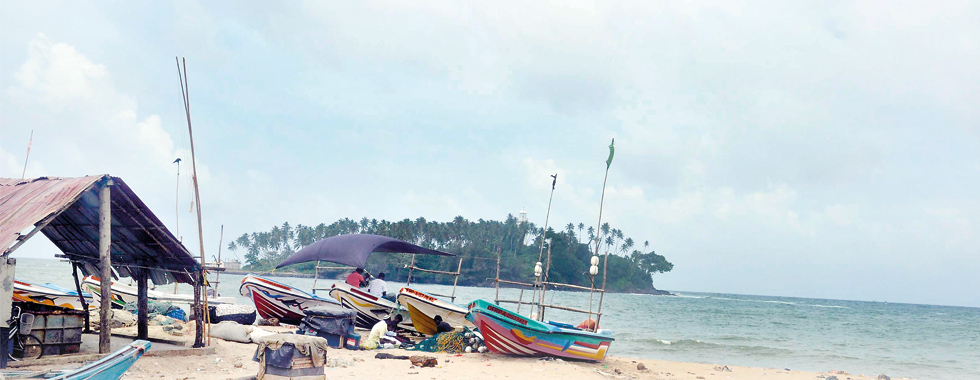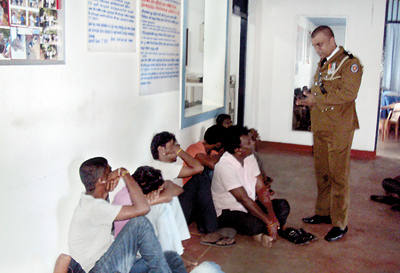News
Botched voyage from Beruwala: Boat people caught in racketeers’ net
The shadowy figures were huddled inside an abandoned guest house on the Beruwala coastline — men, women and children who hoped that, in a few hours, they would be on a boat to Australia. They didn’t even get as far as the beach. The police pounced just after midnight, rounded them up and took them into custody.

Beruwala where the police arrested 46 people who were about to board a boat that they thought would take them to Australia. Pix by Susantha Liyanawatte
There were 46 people, including ten children. The youngest was just two-years-old. The detection was made on Monday. Ethnicity becomes relevant here because of an ongoing discussion about the profile of Sri Lankans who try to flee to Australia by boat. Except for two Muslims from Negombo — who remain in jail over suspicions that they were part of the smuggling ring — all others were from the North and East.
Among them was a couple with a 10-year-old child from Trincomalee. “The mother was a teacher and Tamil,” said a policeman at the Beruwala police station. “The father worked in a private phone company. He was Sinhalese. The boy was deaf so they wanted to go to Australia for medical treatment.”
Initial investigations show that these people had paid between Rs. 450,000 and Rs. 500,000 to join the group. But police were doubtful last week that the expedition’s organisers had ever intended for them to board a trawler. “They had taken these people from place to place for around a month, providing them with food and accommodation,” said the policeman. “They might have been told that a boat will pick them up that night but sometimes there is no boat.”
Instead, the smugglers claim an advance payment and drop the victims off somewhere. Alternatively, they take them out to sea and bring them back to shore saying the boat is leaking or that there is engine trouble. Then, they vanish with the money.
This throws light on a new scam that might be more widespread than initially thought. Agents are believed to be roaming around towns and villages in an effort to cobble together groups of people who can be convinced pay money to board the boats.

The trawler that carried some 40 people and dropped them off in Beruwala last year
But while some do take them in the direction of Australia as promised — a fresh boatload arrived in the Cocos Islands on Thursday — others abscond with the money, leaving victims to the police. “There are usually four or five agents involved at different levels,” said a police sergeant. “One doesn’t know who the other is but their objective is to get the job done. The agents who are caught are usually at the bottom of the network. It is the LTTE system.”
The Muslim men in custody are probably two such people who are at the base of the pyramid. The Criminal Investigations Department is now perusing their phone records to net others in the ring.
This was the fourth detection in Beruwala since last year. In November 2012, a trawler which had set off from Negombo dropped off 43 persons at the Beruwala harbour after having been at sea for ten days. The crew fled before police arrived. Victims had ben told the trawler had engine trouble. It is still anchored at the Beruwala harbour, with a naval guard on watch.
On another occasion, 25 people were arrested on the beach as they were getting ready to board the smaller boats that would take them to the trawler. The Sunday Times visited the parental home of one of the women who had been arrested in that group. She had been pregnant then, her mother said, insisting that her daughter had only been at the beach to send her husband off.
“She married someone we didn’t approve of,” she said. “She might have wanted him to go to Australia to escape the influence of drink and bad friends.” “Those who board those boats know that it’s a journey of life or death,” the mother, who did not wish to be named, said. “But they still go because they have so many economic, personal and other problems here.”
Ironically, this woman rejected the contentions of both the Australian and Sri Lankan Governments that boat migrants were doing poorly or that they were turned away. She said people she knew received information from those settled in Australia that they were earning and living well.
“Sent back?” she asked, incredulously. “When was anybody sent back? It’s not true. They are doing fine there. They are living in villages and they get work. If it’s so bad, why haven’t the Australians sent back people who went like this and are already settled there, living the good life?”

A police officer questioning the would-be boat people Pic by Sarath Siriwardena
She insisted that the only people who are rejected by the Australian Government are those who had pending legal cases or “other problems” back home. But on the Beruwala beach where the detection was made on Monday, we learnt of a Muslim youth who had taken a trawler to Australia and had been repatriated a month ago. His cousin was afraid to talk about him but said he had gone in the hope of studying.
“He did study for about a month but then he was sent back,” she related. “He didn’t tell anybody in the family that he was going. He used some money, around Rs. 300,000, that he had saved up. He told his grandmother he was going to Jaffna. He called us when he landed to tell us where he was.”
This youth now works at his uncle’s shop in Avissawella. Coincidentally, in the house next to his, two other Muslims remain in jail in Galle for having participated in a similar smuggling racket.The Sunday Times contacted the Australian High Commission for information about continuing illegal arrivals from Sri Lanka. We were referred to a media officer from the office of Scott Morrison, Minister for Immigration and Border Protection. Despite several calls, he could not be contacted.
One of the questions we raised was why an expensive and intensive campaign to discourage people from taking boats to Australia was only having limited success.
comments powered by Disqus
